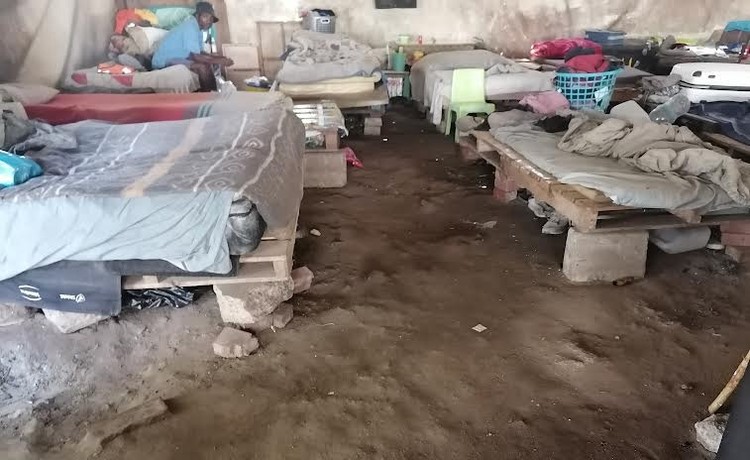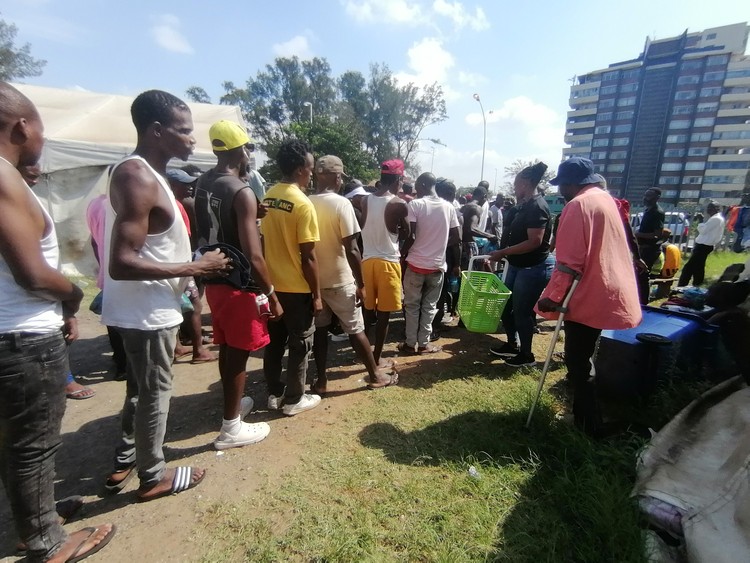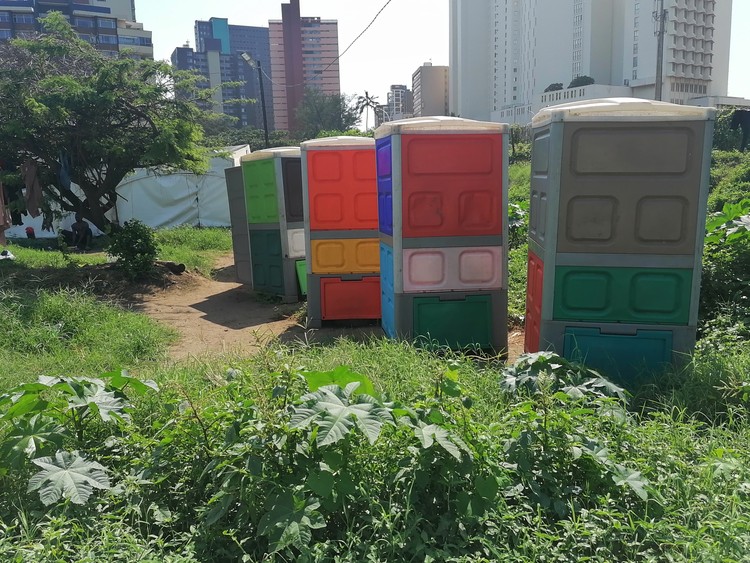No showers, no food, no electricity: the forgotten men of Molyneaux municipal shelter in Durban
More than 200 people still live in tented shelter set up during Covid lockdown
More than 250 men are living in tents in a municipal shelter in Durban set up during the Covid lockdown. Photos: Tsoanelo Sefoloko
- About 250 men are still living in a tented shelter for homeless people set up by the eThekwini municipality during the Covid lockdown.
- They have four mobile toilets, no showers, no electricity.
- The only food - beans and bread - is provided every two weeks by a local non-profit organisation.
- The municipality says the shelter is not intended as a permanent residence.
Hundreds of homeless men are living in a tent shelter in Molyneaux, Durban, set up by the municipality during the Covid pandemic. They have no electricity, showers or cooking facilities.
There are nine tents in the shelter which was set up during the hard lockdown. In one tent GroundUp counted 32 people, who sleep on wooden pallets set on bricks.
The shelter, in Durban north, is run by eThekwini municipality. Municipal spokesperson Gugu Sisilana said the Molyneaux shelter, which officially has 253 residents, is one of three left after Covid. There is another in Block AK, also in the north of Durban, with 170 residents, and a women’s shelter with 125 residents.
Sisilana said the municipality ”provides showers and toilets”. But there is no shower at Molyneaux shelter. There are two taps, and four mobile toilets which are cleaned once a week.
Sisilana also said the City was “providing food to the homeless (one meal per day)”. But people GroundUp spoke to in the shelter said no food was provided by the municipality, only by local non-profit organisations.
Nosipho Zuma, administrator at Community Outreach Program Trust, which is one of the NPOs that bring food, confirmed this. Zuma said the trust provided food parcels twice a month, each containing two tins of beans, eight slices of bread, and one packet of chips.
People in the shelter said the tents are flooded when it rains. The electricity was disconnected some time ago, they say.
Wiseman Scout, who works as a gardener when he can, said the men in the shelter had been forgotten by the municipality.
He said they depended on the NPOs for food, and for safety reasons, were not allowed to cook. “Most of the people staying here are sick, so they have to eat before they can take their medication,” he said.
People queue for food parcels distributed by Community Outreach Program Trust.
Thomas Smith, who is 76 years old and struggles to walk, said he sometimes missed out on the food because there wasn’t enough and he was too slow. “I am too old to run when food parcels arrive. Sometimes I ask the person next to me to get food parcels for me,” said Smith.
“Today we only brought 100 food parcels,” said Zuma. These had to be distributed among 270 people living at the shelter.
Sisilana said: “The City is in the process of establishing a safe sleeping space catering to the homeless, which will be located in Block AK. This space is meant to assist in alleviating the pressure in the two existing male shelters.”
“It should be noted that these shelters are not permanent residences for the homeless. We have established through our research and surveys that most of the people who are in these shelters have homes.”
She said each shelter had a social worker providing psychosocial support and “other essential services such as skills development, reunification with families, Identity Documents applications, and employment opportunities as and when available”.
“The intention is to get them off the streets and back to their families. It is unfortunate that some of them are not willing to engage with social workers; hence, it is difficult to assist them,” she said.
But when GroundUp visited, there was no social worker at the Molyneaux shelter. Scout said a social worker did come to the shelter sometimes, but not often.
There are four mobile toilets, but no showers and only two water taps.
© 2024 GroundUp. This article is licensed under a Creative Commons Attribution-NoDerivatives 4.0 International License.
You may republish this article, so long as you credit the authors and GroundUp, and do not change the text. Please include a link back to the original article.
We put an invisible pixel in the article so that we can count traffic to republishers. All analytics tools are solely on our servers. We do not give our logs to any third party. Logs are deleted after two weeks. We do not use any IP address identifying information except to count regional traffic. We are solely interested in counting hits, not tracking users. If you republish, please do not delete the invisible pixel.





